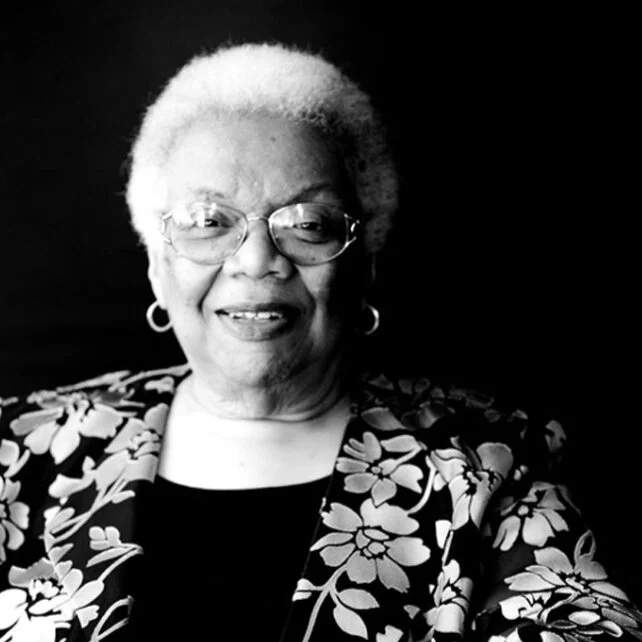Lucille Clifton, 2000. ©Mark Linnehan for the AP
“What they call you is one thing. What you answer to is something else.”
”I write from my knowledge not my lack, from my strength not my weakness. I am not interested if anyone knows whether or not I am familiar with big words, I am interested in trying to render big ideas in a simple way. I am interested in being understood not admired.”
”Writing is a way of continuing to hope. Perhaps for me it is a way of remembering I am not alone.”
Lucille Clifton, born Thelma Lucille Sayles in Depew, New York, grew up in the vibrant city of Buffalo, New York, where she cultivated her early passion for literature and writing. She graduated from Fosdick-Masten Park High School in the year 1953, showcasing her commitment to education. Following high school, she attended Howard University on a scholarship from 1953 to 1955, where she further developed her talents and voice. However, she later decided to leave to pursue her studies at the State University of New York at Fredonia, located conveniently near her hometown of Buffalo.
In the year 1958, the talented Lucille Sayles married Fred James Clifton, an accomplished professor of philosophy at the University at Buffalo, who was also a gifted sculptor known for his intricate carvings that powerfully depicted African faces and cultural themes. Lucille and her husband together welcomed the joy and challenges of raising a large family, having six children who enriched their lives in countless ways.
In 1966, Ishmael Reed shared some of Clifton's poems with Langston Hughes, who included them in his anthology, The Poetry of the Negro. In 1967, the Cliftons moved to Baltimore, Maryland. Her first poetry collection, Good Times, was published in 1969 and named one of the ten best books of the year by The New York Times. From 1971 to 1974, Clifton was a poet-in-residence at Coppin State College in Baltimore. She served as Maryland's Poet Laureate from 1979 to 1985. From 1982 to 1983, she was a visiting writer at Columbia University and George Washington University.Clifton taught literature and creative writing at the University of California, Santa Cruz from 1985 to 1989. She served as Distinguished Professor of Humanities at St. Mary's College of Maryland. From 1995 to 1999, she was a visiting professor at Columbia University, and in 2006, she was a fellow at Dartmouth College.
Lucille Clifton received multiple prestigious awards, including a Creative Writing Fellowship from the National Endowment for the Arts, a grant from the Academy of American Poets, and an Emmy Award. Her children's book, Everett Anderson's Good-Bye, won the 1984 Coretta Scott King Award. In 1988, Clifton was the first author to have two poetry books nominated for the Pulitzer Prize in the same year. She won the Shelley Memorial Award in 1991/1992 and the Lannan Literary Award for Poetry in 1996. Her collection, Blessing the Boats: New and Collected Poems 1988–2000, received the National Book Award for Poetry in 2000. From 1999 to 2005, she was on the Board of Chancellors of the Academy of American Poets. In 2007, she won the Ruth Lilly Poetry Prize for her lifetime achievements, and she also received the Robert Frost Medal from the Poetry Society of America for her overall contributions to poetry.
Ms. Clifton died in Baltimore on February 13, 2010.
won’t you celebrate with me
won't you celebrate with me
what i have shaped into
a kind of life? i had no model.
born in babylon
both nonwhite and woman
what did i see to be except myself?
i made it up
here on this bridge between
starshine and clay,
my one hand holding tight
my other hand; come celebrate
with me that everyday
something has tried to kill me
and has failed.
Lucille Clifton, “won't you celebrate with me” from Book of Light. Copyright © 1993 by Lucille Clifton.
homage to my hips
these hips are big hips
they need space to
move around in.
they don't fit into little
petty places. these hips
are free hips.
they don't like to be held back.
these hips have never been enslaved,
they go where they want to go
they do what they want to do.
these hips are mighty hips.
these hips are magic hips.
i have known them
to put a spell on a man and
spin him like a top!
Lucille Clifton, “homage to my hips” from Good Woman. Copyright © 1987 by Lucille Clifton. Reprinted with the permission of Curtis Brown, Ltd.



